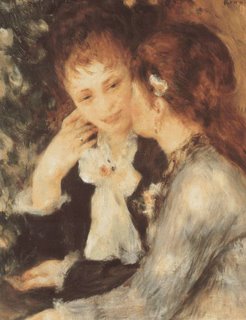 F W Boreham’s close relationship with his mother and his deep appreciation of his wife went a long way towards explaining the many articles and references he wrote in affirming the contribution of women to society.[1] His Mothers’ Day editorials gave him a regular opportunity to extol the values of motherhood and the attributes of women.[2] He wrote on “the ethics of feminine charm”,[3] “the beauty of women”[4] and “womanly intuition”.[5]
F W Boreham’s close relationship with his mother and his deep appreciation of his wife went a long way towards explaining the many articles and references he wrote in affirming the contribution of women to society.[1] His Mothers’ Day editorials gave him a regular opportunity to extol the values of motherhood and the attributes of women.[2] He wrote on “the ethics of feminine charm”,[3] “the beauty of women”[4] and “womanly intuition”.[5]Many of Boreham’s articles on women depicted their primary role as being in the home, as was his own wife, commonly referred to in his writings as “the mistress of the manse” and “the heart and soul of his home”.[6] These editorials, which portrayed women as the “colonial helpmate”,[7] were illustrated by the wives, sisters or mothers of significant writers and statesmen and recognized the debt of men to women in their hidden influence as “wirepuller”,[8] “first mate” or “right hand man”.[9]
Boreham’s editorials also focused on the contribution that women might make to society in their own right and in a public role. At a time when many Australian clergy were preoccupied with issues of intemperance, impurity and gambling,[10] it is heartening to read Boreham’s timely calls to remember “the women of the war”[11] and to draw attention to the plight of deserted women.[12] While Boreham did not make any specific responses to feminism in different spheres of society, he was attuned to the way that by the 1920s Australian culture had become “feminized”.[13] He observed this change in the growing electoral power of women as they had been granted suffrage in the last decade of the nineteenth century and in their exercise of political power.[14] Women’s suffrage was instrumental in achieving a number of what Boreham considered worthy goals: temperance, laws against gambling, control of prostitution, an increase in the age of consent and prevention of domestic violence.[15] Boreham was encouraging of the changing role of women, as he discussed the effects of “the emergence of women in public life”.[16] These moves initially had been fostered by the Women’s Christian Temperance Union (founded in 1882) and later encouraged by the establishment of the Housewives’ Progressive Association in 1917 and the recommendations from the Conference of the Australian Federation of Women Voters (especially those in 1921 and 1924).[17] Others like Edith Cowan, who became the first woman to enter federal parliament in 1921, indicated that the mood was changing.
Boreham’s loudest calls for the equality of women came through his numerous biographical editorials, particularly those about women writers. Focusing on writers drawn from the Victorian era, Boreham highlighted the suspicion and distrust in which “publishers fought shy of petticoats”[18] and ridiculed the prejudice that compelled women to write anonymously.[19] In a variety of stories highlighting the courageous leadership of Queen Victoria[20] and Catherine Booth,[21] the justice of Elizabeth Fry[22] and Josephine Butler,[23] the compassion of Florence Nightingale[24] and the generosity of the Countess of Huntingdon,[25] Boreham sought to inspire women to seek political leadership, to fight for justice and to ‘make the most of themselves’.
Geoff Pound
Image: Renoir's Young Women Talking
[1] The survey (referred to earlier in this chapter), undertaken by the author, from a sample of sixty-eight biographical editorials drawn from the 1940s and 1950s revealed that ten percent of Boreham’s editorials focussed on women.
[2] Boreham, Mercury, 7 May 1932.
[3] Boreham, Mercury, 24 October 1931.
[4] Boreham, Mercury, 14 August 1954.
[5] Boreham, Mercury, 7 May 1932.
[6] Crago, The story of F W Boreham, 75.
[7] This term is from Patricia Grimshaw, ‘Only the chains have changed’, in Staining the wattle: A people’s history of Australia, eds. Verity Burgmann and Jenny Lee (Ringwood, Vic.: Penguin, 1988), 77.
[8] Boreham, Mercury, 19 May 1934.
[9] Boreham, Mercury, 13 August 1949.
[10] Michael McKernan, Australian churches at war: Attitudes and activities of the major churches 1914-1918 (Sydney: Catholic Theological Faculty and Australian War Memorial, 1980), 2.
[11] Boreham, Mercury, 30 November 1918.
[12] Boreham, Mercury, 29 June 1914.
[13] Marilyn Lake, ‘The politics of respectability: Identifying the masculinist context’, Historical Studies 22 (4 1986): 129-130.
[14] Boreham, Mercury, 3 March 1916.
[15] S Macintyre, A concise history of Australia (Cambridge: Cambridge University Press, 1999), 134.
[16] Boreham, Mercury, 31 May 1924.
[17] Clark, A history of Australia vol. vi, 231-232.
[18] Boreham, Mercury, 11 November 1944.
[19] Boreham, Mercury, 27 April 1946.
[20] Boreham, Mercury, 24 May 1952.
[21] Boreham, Mercury, 4 October 1947.
[22] Boreham, Mercury, 12 October 1946.
[23] Boreham, Mercury, 13 April 1946.
[24] Boreham, Mercury, 18 August 1945.
[25] Boreham, Mercury, 18 June 1949.


